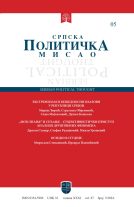- Home page
- Researchers
- Ranka Vujović
Ranka Vujović
Republic secretariat for legislation

PROHIBITION OF CORPORAL PUNISHMENT OF CHILDREN IN SERBIA
Considering the Second and Third Periodic Report of the Republic of Serbia on the exercise of the rights of the child as guaranteed by the Convention on the Rights of the Child, the United Nations Committee on the Rights of the Child submitted to our country 41 recommendations for the promotion of children's rights, including a recommendation on the explicit prohibition of the corporal punishment of children. The recommendation suggests the need to explicitly prohibit corporal punishment of children by law, to monitor and enforce this prohibition in all environments, and to promote positive, nonviolent and participatory methods of education through awareness raising. The issue of the admissibility of corporal punishment of children has long been a topic on which there is no consensus in the domestic general and professional public, and the aforementioned recommendation also raises the question of the degree of compliance of local regulations on the rights of the child with international standards and practice in the field among experts who believe that corporal punishment of children is absolutely unacceptable. While some consider that the local legal framework for the prohibition of child abuse and neglect is quite satisfactory and that the Republic of Serbia, in compliance with the obligations undertaken by signing, ratifying or acceding to numerous international human rights and child rights treaties, has harmonized its domestic legislation in this matter with the required international standards, at the level of individual institutions and bodies responsible for monitoring the situation in the field of human rights and the rights of the child there is the view that in our country the corporal punishment of children is still not forbidden by law. A critical analysis of applicable regulations in the Republic of Serbia regulating the rights of the child to dignity and physical integrity in all relevant areas (family relations, social protection, education, student standard, health, etc.) suggests that legal terminology, or more precisely the lack of precise legal definition key terms, such as: “physical punishment”, “physical abuse”, “violation of dignity”, “humiliating treatment”, etc., leads to different interpretations of the permissibility of corporal punishment, and therefore, an interpretation emerges, as the dominant one, according to which in the Republic of Serbia corporal punishment of children by parents for the purpose of education is allowed, if it is not humiliating and does not hurt the human dignity of the child. As education through corporal punishment can seriously harm the establishment of a child’s value system because it represents a model of behavior offered to the child and suggesting that violence is an acceptable and appropriate strategy for resolving conflict in society, adopting such ethical views is very detrimental to the community. Therefore, prescribing an explicit ban on corporal punishment of children in domestic legislation governing the rights of the child is still a necessity. Not only that. In formulating future norms, attention should be paid to the issue of definitions and delineation of key terms, in order to avoid identifying corporal punishment with child abuse, which has so far been identified in practice as a problem.
